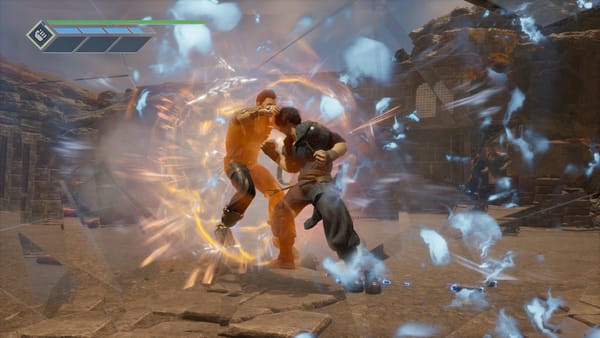#118: Build back worse
Nine months after being booted from app stores, Fortnite is back on mobile — sort of. Rejoice, the billionaires say.
Tim Sweeney’s in fine fettle this week, which is lovely news for folks who get off on seeing billionaires happy — a small number, you might think, but after a cursory browse of Sweeney’s Twitter replies such people appear to be legion. The Epic Games CEO is chuffed to bits because Fortnite is now back on mobile devices thanks to Microsoft’s XCloud streaming platform, which can be accessed on iOS and Android through a webapp. Personally I have always found playing a game designed for a big screen on a phone to be quite unpleasant, but who am I to judge the many millions who play Fortnite and its ilk in this way? If it works for them then fine. Doing so over the cloud, though? Nope, not having that. Still, Tim’s delighted about it, and if you haven’t been keeping up with the Epic v Apple war, that is really the only thing that matters.
I do like Tim Sweeney, to be clear. As I have said before, he is the rare sort of billionaire that seems determined to use his recently found power and wealth for good, by buying up a load of land for conservation, challenging Steam’s and Apple’s dominance over their respective domains, and stuff like that. He is right that Apple and Google’s revenue-share and payment policies are at best unfair to developers and, at worst, monopolistic. I am fine with the idea of him challenging this in courtrooms on three continents, and if his campaign should ultimately succeed I will, in line with UK tradition, celebrate his achievement by banging some saucepans on my doorstep at an appointed weekly time (I’d prefer Wednesday evening if possible). What I do not like about all of this, however, is his dressing up of it as some kind of lofty consumer cause; as if Tim, with great benevolence, has bloodied the nose of Big Tech for the benefit of the little guy. You’re Big Tech as well now, Tim! Stop hitting yourself.
Sweeney celebrated Fortnite’s sort-of-return to iOS and Android yesterday by declaring it “monumental news”. Sure, providing we discount the fact that Fortnite has been available on mobile devices for a couple of months, in similarly suboptimal fashion, through GeForce Now; that this is not a victory in the fight against app store policies, but merely a workaround for them; and that the end user’s experience is worse than before by virtue of it being cloud streamed instead of native. So, no, not that monumental, really.
It certainly doesn’t strike me as something Sweeney should be shouting about from the rooftops. Almost nine months after Fortnite was kicked off the App Store and Google Play, the millions of players whose engagement with and love for the game Sweeney callously deemed a necessary sacrifice for his cause célèbre can now play the thing on phones and tablets again. I mean, if this was me, I probably wouldn’t be soliciting high fives on Twitter. I’d probably apologise, I think, for the disruption? And rather than sell XCloud as a victory I’d maybe frame it as a temporary solution while Epic’s hitherto failed legal cases make their way through the world’s appeals courts? Dunno. I am no billionaire, certainly, and it is abundantly clear that these guys are simply built different.
All that has really happened here is that Tim Sweeney has been given licence to go on Twitter and flick Apple the Vs by cosying up to another trillion-dollar company and effectively turning on a sort of regulatory noclip. It enables Microsoft to play saviour, and Sweeney to claim triumph. It gives millions of forgotten players a way to get back into Fortnite, sure, but they should not have been forgotten in the first place, and I struggle to see this as a victory for anything but the egos of a handful of rich people who already hardly lacked for self esteem. We already know we are all ultimately billionaires’ playthings. We should not take kindly to being asked to celebrate our latest reminder of the fact.
MAILBAG!
- “It does feel like everybody could potentially win from the Square Enix deal,” Lewis writes in response to Tuesday’s Hit Points, about Embracer’s knock-down acquisition of the Japanese publisher’s western operation. “Perhaps those neglected (but loved) IPs will get a chance to shine again, and Square Enix gets a nice bundle of cash to spend on the blockchain, or NFTs, or the metaverse, or whatever buzzword its president is excited about that week. And the deal certainly explains why Yosuke Matsuda suddenly declared that Japanese studios shouldn't make games aimed at Western players the other week. I imagine he was grumpily staring at the 'below expectations' revenue figures for Tomb Raider and Deus Ex when he thought that one up, while conveniently forgetting about Capcom's success with Resident Evil and Monster Hunter.” I deliberately avoided dunking on the blockchain stuff that Square Enix crowbarred into the deal announcement because I think it was mostly about placating investors, but yes, I think Square Enix’s failure to make a success of western development says more about Square Enix than it does the developers involved.
- Here’s Juliano, with more of same. “After a quick glimpse at a news site's headline I had to look it up to confirm that the $300m included the IP too, because I simply couldn't believe it. I can't shake the feeling it was a steal.”
- “I wish there was something like this in Spanish. The insights from magazines and newsletters in Spanish are horrendous and pointless,” writes Luis from… Colombia? Heavens. The gospel spreads, it seems. “Thank you for making Hit Points. It is nice. Once I have disposable income, I will subscribe with my cold hard earned Pesos.” No, good sir, thank you.
MORE!
- I do not listen to many podcasts — not enough chest-rattling basslines, you see — but a special shoutout for this week’s instalment of The Back Page, the excellent videogame pod from my fellow Future Publishing alumni Matthew Castle and Samuel Roberts. Their guest this week is Jen Simpkins, who succeeded me as editor of Edge and is these days at Media Molecule. Jen is a dear friend and it’s a lovely listen, not least because she hasn’t slagged me off too badly (yet, anyway, I’m still only halfway through). Go!
- The US Federal Trade Commission has announced an investigation into Sony’s proposed $3.6bn acquisition of Bungie, which sources reckon could hold up completion of the deal by six months.
- Blizzard has announced the appointment of former Disney exec Jessica Martinez as VP of culture. The news follows Activision Blizzard’s hiring last month of Kristen Hines, from Accenture, as head of diversity, equality and inclusion. Says a lot, I think, that hires like these are coming from outside the game industry.
- Summer Game Fest returns in June 9, Everywhere’s Geoff Keighley has confirmed. You can go and watch it at your local IMAX if you’re so inclined, and are insane.
- Haden Blackman is stepping down as bossman of Mafia III developer Hangar 13 “to pursue his passion at a new endeavour.”
There you go! Another week in the books. I think perhaps we’ll return to our regularly scheduled thrice-weekly schedule from Monday, but let’s see how that pans out. I’ve got the bones of something rattling around in my brain, sparked off by Rogue Legacy 2, that might take a bit more time than usual to put together.
As ever, if you’ve enjoyed this, please do give it a share, be that on the ol’ socials, by forwarding this email to a friend, or by shouting about it through random people’s letterboxes. (Actually let’s all do that, it sounds fun.) And hey, if you do enjoy Hit Points, perhaps you’d consider a paid subscription? While this is not my primary source of income, I would dearly love it to be, and that can only happen with your support.
Have a delicious weekend, leave a comment or send me a reply if you’re so minded, and I’ll catch you all next week.





